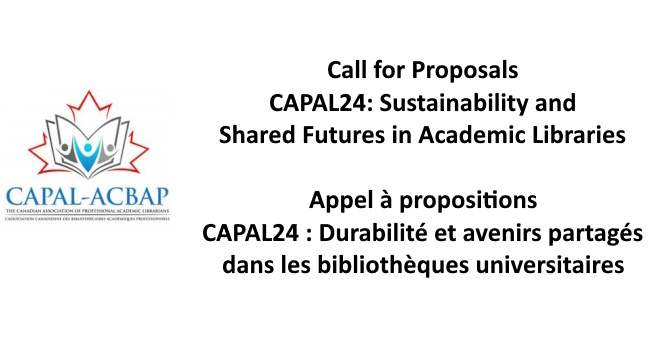
Call for Proposals: CAPAL24: Sustainability and Shared Futures in Academic Libraries
January 15, 2024
CAPAL/ACBES Virtual Conference and Annual General Meeting June 6-7, 2024
The Canadian Association of Professional Academic Librarians (CAPAL) invites you to participate in its annual conference, to be held virtually. This conference offers librarians and allied professionals across all disciplines an alternative space to share research and scholarship, challenge current thinking about professional issues, and forge new relationships. By holding a virtual conference every second year, CAPAL/ACBES hopes to allow for broader participation in our annual conference.
Theme: Sustainability and Shared Futures in Academic Libraries
As our institutions face increasing structural, political, and social challenges, academic librarians must consider the sustainability of our roles, practices, and profession. The question of sustainability arises in many different facets of academic librarianship. Political sustainability: how can we work individually and collectively to address increased job precarity, shifting role definitions, and the loss of collegial decision making? Social sustainability: how do we move forward as a profession to ensure that we are actively promoting social equity within our professional practice and our institutions? How do we make these gains sustainable and build structures to amplify equity-deserving communities? Environmental sustainability: how can academic staff and organizations build awareness of environmentally sound practices, both within our spaces and our communities? What role can the profession play in building resiliency, and understanding related to the effects of climate change? Technological sustainability: how do we adapt our practices to thrive in an educational landscape increasingly dominated by generative AI and other emerging technologies?
Potential Topics
- Sustainability and collective action of academic librarianship: How are we working towards a collective future that will protect and improve upon our professional gains in an increasingly corporatized setting? What can/should we do to build sustainability in our professional, workplace, and institutional settings?
- AI and academic libraries: What is the role of academic librarians in the increasing use of tools like ChatGPT on our campuses? How does this fit into academic integrity work on our campuses, and should generative AI be framed differently?
- Open knowledge systems: (inclusive of open access, open science, open education, open data, etc.) help to build sustainable structures and improve access to information for all. What is the role of academic libraries in leading or managing these processes? We are increasingly involved in these initiatives, how is this work supported internally and externally within our institutions?
- Social sustainability. How are our organizations creating spaces and resources for equity-deserving communities? How can we improve our services to communities without asking them to take on more work?
- Environmental sustainability: How are we changing our professional practices to acknowledge climate change and its effects on our communities? How could we work with other community actors to increase awareness and to reduce our environmental impacts? What role do academic libraries have in this work?
If you have a topic that is not represented within the theme and topics above, the Program Subcommittee is open to other topics of interest to those who work in academic libraries. Please feel free to contact the Program Subcommittee to discuss a topic for a paper, panel, or other session format at capalconference@gmail.com
Guidelines
The Program Subcommittee invites proposals for individual presentations, panel presentations, and lightning talks. Presentations must be original and may not have been delivered elsewhere. Submissions and presentations may be in either French or English.
New for CAPAL24
For proposals, we will have two streams for the CAPAL24 Conference: practice-based and theory-based. Each stream of proposals will be evaluated separately using different criteria. This is a new process, and it will be reviewed following the conference.
Theory-based proposals can address but are not limited to, reporting on original research and theoretical exploration or critique of professional issues or concerns.
- Individual presentations may vary in length. For individual presentations, please submit an abstract of no more than approximately 400 words, a presentation title, a brief biographical statement, and contact information. You may also indicate the expected length of your presentation (10 minutes for a lightning-strike talk or 20 minutes for an individual presentation).
- For complete panels, please submit a panel abstract of no more than 400 words, a list of all participants, and brief biographical statements. Please identify the panelists and provide participants’ contact information for the panel organizer. If you have an idea for a panel and are looking for other panelists on your topic, the Program Subcommittee can work with you to help identify possible collaborators.
- Students are welcome and encouraged to submit proposals in either stream.
Proposals should be submitted through the proposal submission form. Any questions should be directed to the Program Subcommittee Chair, Laura Koltutsky at capalconference@gmail.com
The deadline for proposals is Friday, February 2nd, 2024 @ 11:59pm PST.
(Via Canadian Association of Professional Academic Librarians)
Add a new comment